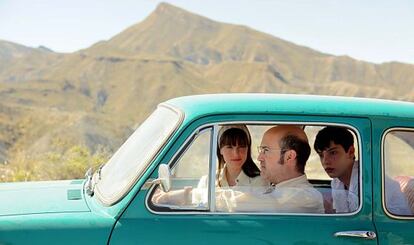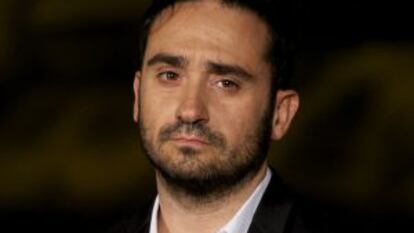Soccer, slaughter and the Beatles
Films about foosball, cannibals and John Lennon are lighting up San Sebastián

Oliver Stone, Annette Bening, Michelle Yeoh, as well as jury members David Byrne, Todd Haynes and Diego Luna, were among the guests on the stage of the Kursaal center as the 61st San Sebastián Film Festival got underway last Friday. After the stars had presented the sections and jury head Haynes had said a few words, this year's swift and simple opening gala concluded with director Juan José Campanella asking the audience to imagine themselves as children once again as they settled back to watch his new feature Foosball, the first-ever animated movie to inaugurate the festival.
A Beatles-obsessed English teacher learns that his hero John Lennon is shooting a movie in Almería
Showing out of competition, the Spain-Argentina co-production follows the adventures of a shy-but-brilliant foosball player who faces a showdown with a fearsome rival. Non-sports fans should not be put off by the subject matter, however: "This film is as much about soccer as Casablanca is about war," explains the Argentinean director, who is returning to San Sebastián for the first time since the 2010 jury overlooked his thriller, The Secret in Their Eyes, which went on to win the Oscar for Best Foreign Language Film.
Movie director Bayona turns critic

J. A. Bayona, the director of The Impossible, took the audience from a state of teary emotion to euphoric solidarity as he collected this year's National Cinema Prize at the San Sebastián Film Festival on Saturday. After accepting the award - of which, at 38, he is the youngest-ever recipient - in polite but sullen fashion from a beaming culture minister, José Ignacio Wert, he spoke about the effort it takes to create a film and of the sacrifices made by his parents, who put away their artistic aspirations in order to raise their family. "My father would also have loved to have attended a school of fine arts but he only had money to subscribe to a magazine drawing course," he said. "In the end he earned his living as a painter with a big brush, but my father is an artist.
"My parents are my heroes. They understood better than anyone that education was not an expense but an investment."
Bayona defined himself as part of a Spanish film industry that was searching to communicate. "We will not get anywhere if we do not consider culture and education as the foundations upon which our society is built."
Finally, he moved on to piracy and the 21-percent VAT rate on cinema tickets imposed by Wert's government last September. "We are at the time of action. And it falls to the state to ensure that we get to make the most of the gold mine we have in our country."
Speaking after the ovation for Bayona, Wert elicited a lukewarm response from the crowd, providing few solutions to the ongoing crisis miring Spain's film industry and admitting that the VAT handicap would "continue the same as last year." Takings at the Spanish box office were down 15 percent in 2012 with a 20.8-percent drop predicted for 2013, according to the latest figures from the FAPAE producers association released Thursday.
"The soccer is solely a big vehicle for narrating the passions of life. It is not a work about soccer, nor is it inspired by any star of that sport, which some evil-minded people might believe." It has been said that the villain of the piece bears a resemblance to a certain Real Madrid player.
Fresh from its positive reception at the Toronto Film Festival, the first Spanish movie to be shown in competition in the Official Selection was Manuel Martín Cuenca's Cannibal. The story of a Granada tailor who seeks out, kills, fillets and eats his female victims with the same cold meticulousness with which he cuts his suits left nobody indifferent on its pass through the Zinemaldia. Adapted from the novel of the same name by Cuban writer Humberto Arenal — of which only the central idea remains, say Cuenca and co-writer Alejandro Hernández — the icy psychological horror features a very precise style, elaborate cinematography, a lot of confidence in Antonio de la Torre's laconic lead performance, and no score.
"That coldness provides the right distance for telling the story; I run away from melodrama, which in real life does not exist," explains Cuenca.
Warming things up was novelist and filmmaker David Trueba's Living Is Easy With Eyes Closed, a road movie — inspired by real events — about a Beatles-obsessed English teacher (played by Javier Cámara) in 1960s Spain who learns that his hero John Lennon is shooting a movie in Almería and travels to meet him, picking up a teenage runaway and a pregnant young woman en route. A reflection on how meeting the right person at the right time can mark you for the better, it features some stunning Spanish scenery.
"I read the story and I thought there was a film in it, not a novel," says Trueba. "It might be because of the landscape. After, I read that John Lennon said in an interview that Almería was like the moon because of its landscape, that it was all very strange, and that he had the feeling of being in Africa."
Tu suscripción se está usando en otro dispositivo
¿Quieres añadir otro usuario a tu suscripción?
Si continúas leyendo en este dispositivo, no se podrá leer en el otro.
FlechaTu suscripción se está usando en otro dispositivo y solo puedes acceder a EL PAÍS desde un dispositivo a la vez.
Si quieres compartir tu cuenta, cambia tu suscripción a la modalidad Premium, así podrás añadir otro usuario. Cada uno accederá con su propia cuenta de email, lo que os permitirá personalizar vuestra experiencia en EL PAÍS.
¿Tienes una suscripción de empresa? Accede aquí para contratar más cuentas.
En el caso de no saber quién está usando tu cuenta, te recomendamos cambiar tu contraseña aquí.
Si decides continuar compartiendo tu cuenta, este mensaje se mostrará en tu dispositivo y en el de la otra persona que está usando tu cuenta de forma indefinida, afectando a tu experiencia de lectura. Puedes consultar aquí los términos y condiciones de la suscripción digital.








































